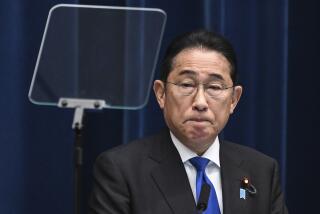Hata Won’t Regain Post, Aide Says : Japan: Leaders of coalition that led the government are staying out of negotiations on a new prime minister.
- Share via
TOKYO — Outgoing Prime Minister Tsutomu Hata’s chief strategist Sunday dismissed the idea that Hata could be reelected prime minister as “divorced from common sense” and declared it should not and would not happen.
Ichiro Ozawa, deputy of Hata’s Renewal Party, made the statement in a news conference after leaders of the coalition that has governed since last summer decided to take themselves out of the initial bargaining to choose a successor to Hata, who resigned Saturday rather than accept expected defeat in a no-confidence motion.
When a reporter asked whether Hata’s resignation was only a “political performance” to meet earlier Socialist demands for their return to the Cabinet, a stern-faced Ozawa replied:
“What? A person who resigned serving again? Such a result divorced from common sense will not happen. There is no reason to expect an outcome divorced from everyone’s common sense and proper constitutional government, nor should such an outcome happen.”
His statement appeared to take Hata out of the running and contradicted Hata’s declaration Saturday that he would “entrust to Parliament” the choice of a prime minister.
Ozawa and other coalition leaders decided they would wait and see what proposals for a new government are made by the Liberal Democrats, who submitted the no-confidence motion against Hata, and by the Socialists, who helped elect Hata on April 25 and then bolted the coalition, leaving it with only 36% of the seats in the lower house of Parliament.
Meanwhile, Yohei Kono, president of the Liberal Democratic Party that lost its 38-year hold on power last summer, said Sunday that his party would be willing to back Socialist Chairman Tomiichi Murayama as prime minister in a new coalition.
The Liberal Democrats’ top five executives agreed that their conservative party should seek a tripartite alliance with the Socialists and the splinter New Party Harbinger of LDP defectors.
“Policy is important. But even before policy, democracy is more important. We must confirm how decisions are to be made” in a coalition, Kono said in an indirect slash at Ozawa, whose leadership style Kono has condemned as “autocratic.”
It was the first time a Liberal Democrat president had ever suggested that a Socialist lead the country.
Since 1955, when the two parties were established, they have been at each’s other throats over security policies, taxes, nuclear energy and diplomacy. During the Cold War era, Socialists urged unarmed neutrality and friendly relations with Communist countries, while the Liberal Democrats upheld the U.S.-Japan Security Treaty and maintained close ties with Western democracies.
Even now, Socialists remain sympathetic toward North Korea, despite suspicions that it is developing nuclear weapons. Socialists hold the swing vote between the coalition on one side, and the LDP on the other.
Kono called Socialist leader Murayama “one choice” among several possible leaders.
Murayama said the Liberal Democrats have failed to reform and said he would first try to reach agreement to rejoin the outgoing coalition. But the coalition rejected his bid.
“With the proposals the Socialists have made so far, we can’t create what Hata urged (in resigning)--a stable Cabinet with a solid base,” said Yuichi Ichikawa, secretary general of the Buddhist-backed Komei (Clean Government) Party.
Earlier, the Liberal Democrats rejected overtures to join the coalition. There is deep resentment in the former ruling party against the walkout last June led by Ozawa and Hata that deprived the party of its majority in the lower house of Parliament.
It was uncertain how long the bargaining will go on before the lower house votes on a new prime minister.
Takashi Yonezawa, chairman of the coalition’s Democratic Socialist Party, suggested that Parliament could end its current session Wednesday as scheduled and reconvene to elect the prime minister sometime before the Group of Seven economic summit from July 8 to 10 in Naples, Italy.
More to Read
Sign up for Essential California
The most important California stories and recommendations in your inbox every morning.
You may occasionally receive promotional content from the Los Angeles Times.













